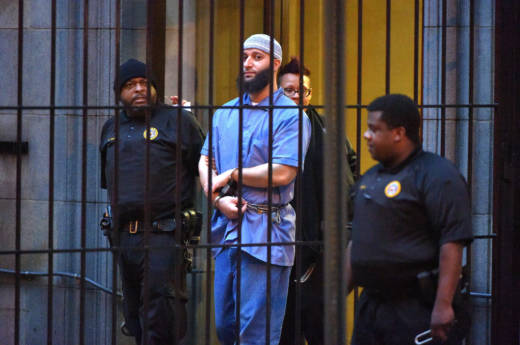Lawyers point to Syed's lack of a violent history (he "has not been cited for a single violent act in 17 years" in prison, the release notes) and to his supportive family to suggest he poses no substantial danger to the community and is not a flight risk. Supporters of Syed have offered up about $1 million in bail money should the judge grant his release, the motion says.
For the non-Serial-obsessives in the audience, here's our brief summary from earlier this year:
"Each season of Serial follows a single true story, told episode by episode.
"The first season investigated the case of Adnan Syed, who was convicted of murdering his girlfriend more than 15 years ago. Host Sarah Koenig and her team uncovered inconsistencies in his case — including the fact that Asia McLean was an alibi witness. She said she'd seen Syed at the time Hae Min Lee's murder occurred, but that testimony was never brought forth in court.
"The podcast became the most-downloaded of all time, fascinating more than a million listeners and inspiring passionate communities of amateur sleuths and Adnan obsessives."
Justin Brown, the lawyer who filed Syed's request to be released from prison, has previously told NPR's David Folkenflik that — given all the sleuthing done not just by Koenig but also by the general public — this case might be the first-ever open-sourced appeals case.
"People were investigating this case all over the country," Brown said. "I had essentially thousands of investigators working for me."
And the motion to free Syed cites the significant media interest generated by Serial and third-party spinoffs as a factor in favor of Syed's release.
"It would be disingenuous to suggest that there is any real probability that Syed would try to harm or intimidate a witness — when, because of the media attention this case has attracted, the whole world is watching him," Brown writes in the motion.
As for being a flight risk, Syed is a recognizable figure now, his legal team argues, and has a strong incentive to prove his innocence through the proper legal process.
While much of the legal filing addresses Syed's likely behavior if he were released on bail, there's also a lengthy section dedicated to critiquing the state's case against him — particularly the credibility of the state's key witness, Jay Wilds.
You can read the full motion here, courtesy of Syed's lawyers, and see the exhibits here.
Copyright 2016 NPR. To see more, visit http://www.npr.org/.9(MDAxOTAwOTE4MDEyMTkxMDAzNjczZDljZA004))

9(MDAxOTAwOTE4MDEyMTkxMDAzNjczZDljZA004))

